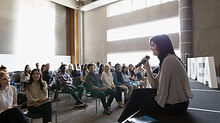S. Kristine Farmer, MS, PHR, SHRM-CP
Ph.D. Candidate, Applied Technology & Performance Improvement
College of Information
University of North Texas
Portfolio Overview
As a labor/employment paralegal, I entered into the doctoral program with a strong background, experience, and understanding of HR laws and how those laws impact the workforce. When that experience was added to my own religious background and personal beliefs, it enabled me to focus a tenet of my research interests in religious accommodation and workplace spirituality. To that end, I was privileged to work with Dr. Kim Nimon, a scholar in the area of workplace spirituality, corporate chaplaincy, and the idea of incorporating prayer rooms in the workplace as well as the impact of praying at work. One of my first writing opportunities came when Dr. Nimon asked me to co-author a paper with her discussing a California case dealing with workplace prayer rooms. Much of my scholarly research within my doctoral portfolio is focused in this area. And, Dr. Nimon and I co-authored a conference paper together on religious accommodation in the workplace, which we presented at the AHRD 2015 International Conference in St. Louis, Missouri.
Additionally, I am an adjunct instructor of paralegal studies and teach in the online synchronous environment, meaning that I use technology such as WebEx (and previously Wimba , now Collaborate) to teach the two capstone-like courses within our program. My paralegal students generally are in the North Little Rock, Arkansas area but I also have had students who reside many hours away in more rural Arkansas, and I am in North Texas. Yet, we are all in the online classroom together for lecture and course work each week. This type of teaching is not widely used in my field, which spurred another area of research interest. In particular, as I progressed through my first minor coursework of higher education, I found myself looking for ways to increase both student-to-student engagement as well as student-instructor engagement in the synchronous online classroom setting. I have written an article for the national paralegal educator association’s journal on this topic. And, co-presented with a colleague to the Teaching with Technology symposium sponsored each year by the University of Arkansas for Medical Sciences.
I believe one of my strengths is in teaching. I am grateful to have been able to co-teach graduate-level courses during my time as a doctoral student. In particular, Dr. Jeff Allen gave me the opportunity to co-teach ATTD 5340 and ATTD 5360 within our ATPI master's program. These were the same two courses that were the source of both my greatest angst and accomplishment in my master’s degree. It was a notable experience to guide other graduate students through the same process which, in the beginning, I was convinced I myself would never master. I was complimented by the faith Dr. Allen showed in me when asking me to co-teach those courses with him, and strongly believe this added immeasurably to my intellectual growth as a teacher and scholar.
Leadership development and training of paralegals and paralegal boards of directors has been a longtime area of interest, and was the focus of my research in my master’s degree. Within the area of professional development and service, I was appointed in 2011 by my national paralegal association’s board of directors to the position of its national leadership training coordinator, and served for three years. During my time in that role, I was responsible for the planning and coordination of an annual leadership training conference, which was well attended by paralegals across the country. And, after the end of my term, I was an invited speaker to the following year’s leadership conference. The progress I made through my doctoral coursework in leadership development served to build upon my prior knowledge, and continues to add to the body of my scholarly work in this area.
As a paralegal educator and leader within the paralegal community, I was appointed to serve on the American Bar Association’s Paralegal Approval Commission, which is part of the service to my profession. This approval and re-approval process is similar to a Southern Association of Colleges and Schools (SACS) accreditation or re-accreditation site visit, although much smaller in scope. Paralegal programs are not required to be ABA-approved, but there are over 250 programs that have chosen to seek and have become ABA-approved. I have served on 12 site teams, and served as the site team chair for 8 of those. This experience has bolstered my own teaching skills and abilities because we evaluate the overall program as well as the practical nature of the assignments and teaching pedagogy to ensure the program falls within the ABA’s Guidelines for Paralegal Programs. I have benefited greatly from learning and meeting paralegal faculty from across the country through this area of service.
One of the more memorable and valuable experiences as a doctoral student was attending a number of my classmates’ doctoral portfolio presentations, dissertation proposals and defenses. Not only did this experience help to shape my own development as a scholar but also exposed me to a broad range of topics within the field of performance improvement. As a trial paralegal, I am usually on the sidelines, so to speak, of the defense or prosecution of our clients' cases. While I have influence in the development of our case themes, topics for direct examination, and ideas and strategies for cross-examination, I am not the person in the “hot seat” in the courtroom. Rather, I am seated next to the attorney in that hot seat. While there is no way to predict how my own dissertation proposal presentation or defense will go, I do know that the experience gained from attending those proposal presentations and dissertation defenses will be invaluable to my own preparation.
My research interests include workplace spirituality, student engagement in the synchronous online classroom as well as quantitative and qualitative legal studies and criminal justice. As you review my Doctoral Portfolio, I believe you will find these interests interwoven throughout my research, teaching, and service scholarship. I am a scholar-practitioner at heart. I desire not only to practice as a litigation consultant, but also to work in tandem with academia to conduct independent research in the areas of civil law and criminal justice. I want my community of practice to include both the practical application of research as well as the development of conceptual theories for use in the legal field. And, I want to continue in the adjunct instructor/lecturer role, both in the areas of paralegal studies and, potentially, in the area of criminal justice.


